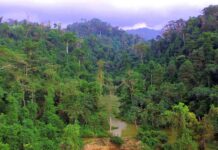A team from the Diverfarming project analyses how institutional settings create cognitive lock-ins in decision-making for farmers when it comes to adopting sustainable farming practices
Dominant agricultural practices nowadays have clear, negative effects such as losses in biodiversity, soil erosion, and water contamination. It has been shown that adopting more sustainable agricultural practices can redress this situation, as well as mitigate the effects of climate change. However, despite the need for change and the demonstrated benefits of more sustainable practices, their adoption is still very slow. What provokes such caution in the agricultural community when it comes to introducing these practices?
According to the most recent literature, there are lock-ins, understood as mechanisms that reinforce themselves and which reproduce the status quo and impede change. Until now, the literature has studied socioeconomic, technological, and institutional lock-ins in order to understand sustainable transition processes in agri-food systems. However, the role of cognitive lock-ins has not been extensively covered.
A team from the universities of Wageningen (the Netherlands) and Exeter (United Kingdom) has analyzed how institutional settings create cognitive lock-ins in decision-making for farmers with regard to the adoption of sustainable farming practices.
Using the example of diversifying crop rotations with leguminous crops as an established strategy to increase biodiversity and soil health, in-depth interviews with farmers established that the specific socio-technical settings where farmers were embedded led them to focus on maximizing profit, namely achieving an economic goal.
However, since farmers tend to associate legumes in rotation with normative goals (namely, “what is appropriate to be done”) rather than economic goals, they are unlikely to consider growing them, regardless of potential benefits and cost savings. Moreover, considering the fact that the farmers interviewed knew the benefits of legumes, the barriers to adopting this type of practice could not be attributed purely to a lack of knowledge.
Cognitive lock-ins therefore drastically reduce the perceived viability of alternative farming practices. Even when they are profitable, the introduction of legumes and similar crops may attract only the most entrepreneurial farmers (e.g. those more innovative and open to risks), but this is not enough to trigger more adoption as needed.
The findings, in this case, suggest that the framework developed for this study can help to identify barriers and specific regional solutions, as well as common solutions, for crop diversification and comparable practices that are relevant for the transition towards sustainability in agri-food systems.
Diverfarming is a project financed by the Horizon 2020 Programme of the European Commission, within the challenge of “Food Security, Sustainable Agriculture and Forestry, Marine, Maritime and Inland Water Research and the Bioeconomy,” under agreement 728003.
Foodmanufacturing.com








